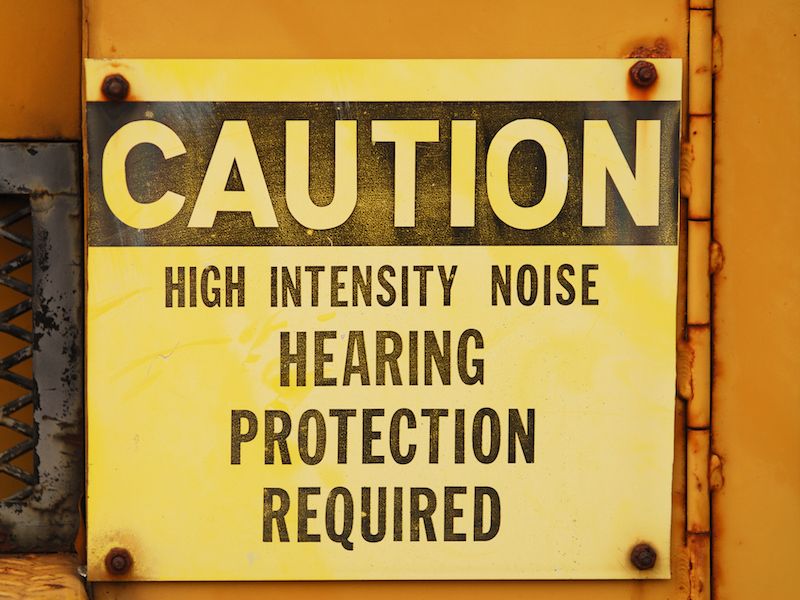
It’s one thing to recognize that you should safeguard your ears. It’s a different story to know when to safeguard your hearing. It’s harder than, for example, recognizing when you need sunscreen. (Are you going to go outdoors? Is the sun out? You should be wearing sunscreen.) It isn’t even as simple as recognizing when to use eye protection (Doing some hammering? Working with a saw or dangerous chemicals? Wear eye protection).
With regards to when to wear hearing protection, there seems to be a large grey area which can be risky. Unless we have specific information that some activity or place is dangerous we tend to take the easy path which is to avoid the problem entirely.
A Tale of Risk Analysis
In general, we’re not very good at assessing risk, especially when it comes to something as intangible as permanent hearing damage or hearing loss. Here are some examples to prove the point:
- Person A goes to a very loud rock concert. The concert lasts approximately 3 hours.
- Person B runs a landscaping company. After mowing lawns all day, she goes home and quietly reads a book.
- Person C works in an office.
You may think the hearing danger is higher for person A (let’s just call her Ann). For most of the next day, her ears will still be screeching from the loud concert. Presuming Ann’s activity was hazardous to her hearing would be fair.
Person B (let’s just call her Betty), on the other hand, is subjected to less noise. Her ears don’t ring. So it must be safer for her ears, right? Not necessarily. Because Betty is mowing all day. Actually, the damage builds up a little bit at a time although they don’t ring out. Even moderate sounds, if experienced with enough frequency, can damage your hearing.
Person C (let’s call her Chris) is even less clear. Lawnmowers come with instructions that indicate the risks of persistent exposure to noise. But although Chris has a relatively quiet job, her long morning commute on the train each day is fairly loud. Additionally, even though she works behind her desk all day, she listens to her music through earbuds. Does she need to consider protection?
When is it Time to Start Thinking About Protecting Your Ears?
Generally, you need to turn the volume down if you have to shout to be heard. And if your surroundings are that loud, you really should think about wearing earmuffs or earplugs.
The limit needs to be 85dB if you want to get scientific. Noises above 85dB have the potential to cause injury over time, so you should consider using hearing protection in those circumstances.
Your ears don’t have their own sound level meter to warn you when you get to that 85dB level, so many hearing specialists suggest obtaining specialized apps for your phone. You will be capable of taking the appropriate steps to safeguard your ears because these apps will tell you when the noise is reaching a hazardous level.
A Few Examples
Even if you do download that app and bring it with you, your phone may not be with you everywhere you go. So a few examples of when to protect your ears may help you formulate a good baseline. Here we go:
- Driving & Commuting: Spending all day as an Uber or Lyft driver? Or perhaps you’re just waiting downtown for work or getting on the subway. The constant noise of living in the city, when experienced for between 6 and 8 hours a day, can cause injury to your hearing over the long term, especially if you’re turning up your music to hear it over the commotion.
- Household Chores: Even mowing a lawn, as previously mentioned, necessitates hearing protection. Chores, such as mowing, are most likely something you don’t even think about, but they can result in hearing damage.
- Listening to music with earbuds. This one requires caution, not protection. Pay attention to how loud the music is, how long you’re playing it, and whether it’s playing directly into your ears. Think about getting headphones that cancel out outside noise so you don’t need to turn up the volume to dangerous levels.
- Using Power Tools: You know that working all day at your factory job is going to necessitate ear protection. But how about the enthusiast building in his workshop? Most hearing specialists will suggest you use hearing protection when operating power tools, even if it’s just on a hobbyist level.
- Exercise: Your morning spin class is a perfect example. Or perhaps your daily elliptical session. You might think about wearing hearing protection to each. The loud volume from trainers who use loud music and microphones for motivation, though it might be good for your heart rate, can be bad for your hearing.
These examples may give you a good baseline. When in doubt, however, you should defer to protection. Compared to leaving your ears exposed to future injury, in most instances, it’s better to protect your hearing. Protect today, hear tomorrow.